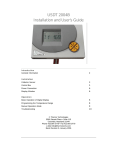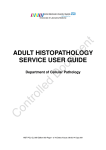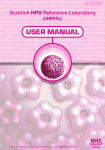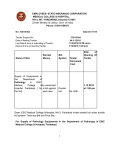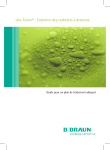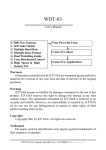Download Non Gynae User Manual 2013 - Central Manchester University
Transcript
Directorate of Laboratory Medicine Cytology Department Non gynaecological cytology service User Manual – January 2013 Table of contents About us Hours of opening Services available at CMFT Services provided to the Christie Hospital Find or contact us at CMFT Find or contact us at the Christie Hospital Specimen acceptance policy Current practice and research activity Collection of serous fluids Collection of cyst fluids Collection of respiratory tract samples Collection of urinary tract samples Collection of cerebrospinal fluid samples Collection of gastrointestinal brush samples Fine needle aspirations How to perform an FNA Making spreads from an FNA Completing the non gynaecological cytology request form Download a non gynaecological cytology request form 1 2 2 2 2 3 4 4 5 6 6 7 9 9 10 11 12 13 14 15 About us The cytology department of Central Manchester University Hospitals NHS Foundation Trust (CMFT) is one the largest unit of its kind in the country providing cervical screening using the SurePath Liquid Based Cytology System and a wide variety of non-gynaecological cytology and synovial fluid analyses services. Please see the Cervical Cytology and Synovial Fluid User Manuals for more information on those services. Our non gynaecological cytology services include fine needle aspiration (FNA) as well as exfoliative cytology. We also provide a non-gynaecological service to The Christie Hospital NHS Foundation Trust. As of January 1st 2013, our services have been expanded to incorporate Trafford General Hospital which is now part of CMFT. The department is housed in a new building with state-of-the-art facilities and is affiliated to the North West Cytology Training Centre, which is situated on the ground floor of Clinical Sciences Building 2. The department is fully CPA accredited. We are fully committed to maintaining this accreditation by an established quality management system and standards determined by the Royal College of Pathologists together, with scheduled clinical and quality audits and national guidelines. Hours of opening The department is open from 08:00 hrs – 17:00 hrs, Monday to Friday (except bank holidays) Non-gynaecological samples should be received in the department by 16:45 hrs. Services available at CMFTNon-gynaecological Cytology 1. Exfoliative cytology 2. Biomedical scientist (BMS) assistance at radiological and ad hoc FNA clinics 3. BMS assistance and on site specimen adequacy assessment at dedicated Head and Neck clinics, including thyroid – usually Tuesday mornings and alternate Thursday afternoons 4. On site consultant led provisional diagnoses/adequacy assessment of endobronchial ultrasound (EBUS) FNA samples. Services provided to the Christie Hospital 2 Non-gynaecological Cytology 1. Exfoliative cytology 2. Fine needle aspiration cytology, including BMS assistance in slide preparation and on site specimen adequacy assessment. Find or contact us at CMFT The cytology department is located on the first floor of Clinical Sciences Building 2. All visitors should access the department via the reception area of Clinical Sciences Building 1. Please also contact us if you have any complaints or service improvement suggestions. Address Email: Cytology Department First Floor Clinical Sciences Building 2 Manchester Royal Infirmary Oxford Road Manchester M13 9WL [email protected] Telephone Enquiries General Non-gynaecological results Booking an FNA (at CMFT) Advice on non-gynaecological sample collection Telephone 0161 276 5115/8817 0161 276 5115/5116/6727 0161 276 5111/8817 or Bleep 07659545074 0161 276 5111/5115 Fax 0161 276 5113 Name Dr M Desai Position Head of Service & Director of the North West Cytology Training Centre Telephone 0161 276 5099 E - mail [email protected] Dr D N Rana Consultant Cytopathologist & Clinical Lead for Nongynaecological Cytology, 0161 276 5108 [email protected] Dr M Holbrook Consultant Cytopathologist 0161 276 6475 [email protected] Dr M Perera Consultant Cytopathologist 0161 276 5109 [email protected] Dr S Thiryayi Consultant Histo/cytopathologist 0161 701 7570 [email protected] Annette Lawton Medical Secretary 0161 276 5115 [email protected] Nicola Wood Medical Secretary 0161 276 5116 [email protected] Helen Wilson Medical Secretary 0161 276 6727 [email protected] Jennifer Bradburn Medical and North West Cytology Training Centre Secretary 0161 276 8804 [email protected] Adanna Ehirim Chief Biomedical Scientist 0161 276 5119 [email protected] Daniel Smith Cellular Pathology Manager 0161 276 6138 [email protected] 3 Find or contact us at the Christie Hospital We are located in the Bereavement Suite at Christie Hospital and are available between the hours of 09:00 hrs to 12:30 hrs, Monday to Friday (except bank holidays). One staff member is available for FNA services and answer queries relating to non-gynaecological cytology only. Telephone Enquiries General Non-gynaecological results Telephone 0161 446 3643 See CMFT number above Booking an FNA (at Christie) Advice on non-gynaecological sample collection 0161 446 3643 0161 446 3643 E mail No results are issued at Christie [email protected] Specimen acceptance policy Each specimen must be accompanied by a completed and matching sample request form. Please ensure all fields of request forms are completed. See page 14 for instructions on filling out the non-gynaecological request form. A blank copy of same is available for download on page 15. Alternatively, we can supply bulk forms on request. All specimen containers must be clearly labelled with: 1. Patient’s full name 2. Date of Birth 3. NHS &/or Hospital number 4. Specimen type (non-gynaecological) 5. Clinical details Turn around time Non-gynaecological cytology reports are printed and sent out daily, addressed to the consultant or GP who requested the test. Reports of any malignancy are faxed. To discuss the cytology report with the Consultant Cytopathologist, contact the department between 08:00 hrs and 17:00 hrs on 0161 276 5115/5116 Urgent specimens 4 Urgent specimens will be reported at least verbally within three (3) working days of receipt by the laboratory. Please provide a contact details on request card. This may only be a provisional report pending further ancillary tests. It is recommended that the requesting clinician discuss such specimens with the Cytopathologist between 08:00 hrs and 17:00 hrs on 0161 276 5115/5116. In all cases, the clinician should telephone the laboratory in advance and provide a contact name and phone or bleep number. Routine specimens Routine specimens will be reported within five (5) working days of receipt. This may vary depending on the specimen type and if additional clinical information or ancillary tests are required e.g. immunocytochemistry Current practice and research activity 5 We currently use a mixture of direct spreads, cytospins and SurePath® Liquid Based Cytology (LBC) technology in our sample preparation. Our research activities include: 1. Penile brush cytology 2. Oro-pharyngeal brush cytology 3. High risk HPV testing in head and neck cancers 4. Molecular testing in selected non small cell lung cancer cases 5. Dual antibody staining for immunocytochemistry. Non-gynaecological cytology sample collection Serous fluid samples including peritoneal washings Please see specimen acceptance policy on page 4 Body cavity fluids (pleural/ascitic/peritoneal fluid/peritoneal washing/pericardial) 50-100mls fluid should be sent in a clean dry container with screw cap (Note: no formalin or alcohol should be added to the sample as both of these can cause interference with adherence to slide and quality of staining) The fluid should be submitted as soon as possible to minimise cell deterioration, so that cell preservation is not compromised. If there is a delay in delivering the sample to the laboratory, the sample should be kept in a fridge at 4°C (Note: the sample should NOT be frozen) Cyst fluid Cyst fluid should be put into a clean dry container with screw cap. The sample should be sent as soon as possible in order to minimise cell deterioration. However, if there is a delay in the sample being delivered to the laboratory, it should be kept in a fridge at 4°C (Note: the sample should NOT be frozen) 6 Respiratory tract samples Please see specimen acceptance policy on page 4 Transbronchial FNA – see FNA section Endobronchial ultrasound FNA (EBUS FNA) We are please to announce that we started a consultant led EBUS FNA service in October 2012. A Consultant Cytopathologist is on site to provide preliminary diagnoses with technical assistance provided by a biomedical scientist. This has proved extremely successful in terms of preliminary diagnosis, specimen triage and reflux molecular testing. Sputum 7 Best results are achieved with freshly obtained sputa following chest physiotherapy, with an early morning sputum before the patient has eaten Contamination with large amounts of saliva or food leads to inadequate specimens Multiple specimens (usually x 3) may be necessary, but these should be sent on 3 separate days, not all taken at the same time Send in clean, dry container with screw cap If examination for eosinophils is required please indicate this on the request form. Bronchial aspirates, lavage, wash, trap and bronchoalveolar lavage samples Fresh specimen should be placed in a clean dry container and an equal volume of CytoRich® Red preservative fluid immediately added for fixation. The time of this fixation should be indicated on the label of the container. ® If CytoRich Red preservative fluid is not available, fresh specimen should be placed in clean dry container. Delay in receipt unfixed samples can lead to deterioration of specimen. ® If differential cell count is required, DO NOT USE CytoRich Red preservative fluid. Please send the sample unfixed. DO NOT USE FORMALIN FIXATIVE. Fresh Specimen Specimen with an equal volume ® of CytoRich Red preservative fluid ® Please note: When the stock of CytoRich Red preservative fluid is running low or close to its expiry date, please contact the cytology department on 276 5111/5116 for replacement. Bronchial brush samples 8 ® Place brush into clean screw capped container with CytoRich Red preservative fluid. Ensure brush is fully immersed in preservative. The time of this fixation should be indicated on the label of the container. DO NOT USE FORMALIN FIXATIVE Please note: When the stock of CytoRich® Red preservative fluid is running low or close to its expiry date, please contact the cytology department on 276 5111/5116 for replacement of stock. Urinary tract samples Urine (including voided, catheter, urethral washings and ileal conduit samples) Collect urine in a clean, dry container with a screw cap. A 20ml to 50ml container is suitable. An adequate urine sample is the second voided of the day, preferably mid morning or random Please note: The first sample voided in the morning is unsuitable for cytological analysis. Urine can be collected from catheters as well as washings from the bladder or upper urinary tract. The request form must state the method of collection. If there is a delay in delivering the sample to the laboratory, the urine sample should be kept in a fridge at 4ºC. Industrial Urine samples The preferred method for the collection of industrial urine samples is the same as above (preferably in 25ml Universal tube). Please contact the cytology department in advance when sending large number of samples. Cerebrospinal fluid (CSF) Please see specimen acceptance policy on page 4 9 A clean, dry container with screw cap should be used. CSF samples are liable to degenerate rapidly and as such must be prepared immediately. Please contact the laboratory to inform staff of imminent arrival of a CSF sample, and leave a bleep or contact number. Latest processing time for samples is 15.30 hrs Mon-Fri. CSF samples must be received at least half an hour before this time. If out of hours sampling is unavoidable, storing the sample in refrigerator at 4°C may help preserve cells for up to 24 hours. Gastrointestinal Tract Brushings (including bile duct) 10 Place brush into clean screw capped container with CytoRich® Red preservative fluid. Ensure brush is fully immersed in preservative. The time of this fixation should be indicated on the label of the container. DO NOT USE FORMALIN FIXATIVE ® Please note: When the stock of CytoRich Red preservative fluid is running low or close to its expiry date, please contact the cytology department on 276 5111/5116 for replacement of stock. Fine needle aspiration cytology samples We provide biomedical scientist (BMS) assistance at FNA clinics to prepare direct spreads and needle rinses. Please note the BMS staff do not perform the aspirations. We do provide BMS on site rapid specimen adequacy assessment at Head and Neck clinics, including thyroid, every Tuesday mornings and alternate Thursday afternoons. The staff in the laboratory will be pleased to advise and assist on any aspect of sample collection, please contact the department at: Cytology Department, Monday to Friday between 08:00 hrs and 17:00 hrs on 0161 276 5111/ 5115/5116. We may also be contacted by bleep on 07659 545074 Please note calls must be received by 16:15 hrs for FNA attendance. In the absence of Cytology staff assistance, a guide to performing aspirations and making spreads is given on pages 12 and 13 respectively. Christie hospital – FNA clinics Monday to Friday 09:00 hrs to 12:30 hrs on 0161 446 3643 It is recommended that the support of a BMS be utilised for optimal sample preparation Use of fine needle aspiration . Patients presenting with palpable lesions in clinics (ENT, maxillofacial), outpatients and wards. Deep seated lesions sampled by radiologically guided techniques (Ultra Sound, CT) Endoscopic and transbronchial guided specimens For all Radiology, Endoscopy (EUS FNAs), Respiratory Medicine (EBUS FNAs) and Head & Neck (ENT and Maxillofacial) departments please book with the Cytology Department in advance. Equipment required for a fine needle aspiration Standard disposable 21-25 gauge needles. A 25 gauge (orange) needle is suitable for most lesions. Disposable 5-10 ml plastic syringe. Clean container with tight lid (preferably universal) containing CytoRich® Red preservative fluid Standard microscopic glass slides onto which aspirate is to be smeared Completion of request form and sample container Please see specimen acceptance policy on page 4 WW 11 Part A - How to perform a fine needle aspiration Disinfect skin using pre-packed alcohol swabs. Before insertion of needle wipe away any excess ultrasound jelly with tissue paper (if U/S guided) Perform the aspiration according to the instructions A - G A Position needle within target tissue B Pull plunger to apply negative pressure C Move needle back and forth inside target D Release negative pressure while needle remains in target tissue E Withdraw needle F Detach needle and draw air into syringe G Push a drop of sample onto microscopy slide th Figure taken from Fine Needle Aspiration. (2005), 4 Edition. S. Oreell; G.F. Sterrett; and D. Whittaker. Elsevier Churchill Livingstone. 12 Part B - Making spreads from fine needle aspirations The ideal FNA sample is prepared as follows: Even monolayer spreads onto glass slides for air-dried ‘direct smears’ 2 passes are recommended for each case If Tuberculosis is suspected, please also send an aspirate to microbiology in a sterile container. ® Needle to be rinsed in CytoRich Red preservative fluid (if available) or sterile saline Step 1: Having expelled a small drop of the aspirate onto a glass slide (step G above), place a clean slide (spreader) above the drop and spread gently but swiftly. Leave to air dry. Step 2: Rinse the remaining material from the needle into the CytoRich® Red preservative fluid by repeated aspiration and expelling of the said CytoRich® Red preservative fluid Step 3: Label container containing CytoRich® Red preservative fluid according to specimen acceptance policy (page 4) and use a pencil to label slide. Step 4: Complete request form (see page 13), package sample and send to Cytology Department, Clinical Sciences Building 2. 13 CMFT off site non-gynaecological cytology request form PATIENT’S DETAILS:(AFFIX STICKER HERE) SPECIMEN DETAILS: (PLEASE TICK) Surname Forename Address Sex DOB Private/ NHS URINE Voided Catheterised Post instrumentation Ileal conduit Ureteric Urethral washing [ [ [ [ [ [ ] ] ] ] ] ] BODY CAVITY Pleural Fluid Pericardial Fluid Ascitic Fluid Peritoneal Fluid Peritoneal Washing [ [ [ [ [ ] ] ] ] ] CSF [ ] Cyst Fluid Please state site [ ] BRONCHIAL - Brush - Lavage/Wash Trap/Aspirate [ ] [ ] [ ] Comment [Aae1]: Please state clearly the site aspirated or topography of sample - Bronchoalveolar Lavage [ ] Please state site and side of lobe. FNA TECHNIQUE Ultrasound Guided CT Guided Transbronchial [ ] [ ] [ ] FNA SITE & SIDE (Lt/Rt): Hospital/NHS number Ward/Dept OTHER Please state site Consultant to whom the report is to be sent (please print): Copy report to/ Department (please print): Comment [Aae2]: This is the treating consultant to whom the report must be sent. Consultant’s department where report is to be sent: Date taken: Comment [Aae3]: Department of treating consultant. Bleep/contact number (for requesting consultant): Time taken: HEAD AND NECK FNAs (Please indicate and label site on diagram below) CLINICAL INFORMATION Comment [Aae4]: It is essential that a complete history is given such as previous diagnoses and/or duration of symptoms etc. Clinical History ……………………………………………. Right Left ………………………………………………………………. Significant Findings…………………………………………. ……………………………………………………………….. Comment [Aae5]: Radiologica l findings &/or clinical impression are extremely helpful to the cytologists. Diagnosis…………………………………………………….. Previous Cytology …………………………………………... Previous Histology ………………………………………….. Previous Treatment Chemo/radiotherapy ………………………………………. High Risk Yes No Aspirating Clinician (PLEASE PRINT) ……………………………………………………….Contact no./bleep…………. Signature and date……………………………………………………………………………………………………………….. N.B. Incomplete forms will result in delay in the reporting of the specimen Visit our website: www.cmft.nhs.uk 14 Comment [Aae6]: Previous &/or current treatment regimes help avoid under and over diagnosis Comment [Aae7]: Name and contact number of the clinician taking the sample is essential. CMFT off site non-gynaecological cytology request form PATIENT’S DETAILS:(AFFIX STICKER HERE) SPECIMEN DETAILS: (PLEASE TICK) Surname Forename Address Sex DOB Private/ NHS URINE Voided Catheterised Post instrumentation Ileal conduit Ureteric Urethral washing [ [ [ [ [ [ ] ] ] ] ] ] BODY CAVITY Pleural Fluid Pericardial Fluid Ascitic Fluid Peritoneal Fluid Peritoneal Washing [ [ [ [ [ ] ] ] ] ] CSF [ ] Cyst Fluid Please state site [ ] BRONCHIAL - Brush - Lavage/Wash Trap/Aspirate [ ] [ ] [ ] - Bronchoalveolar Lavage [ ] Please state site and side of lobe. FNA TECHNIQUE Ultrasound Guided CT Guided Transbronchial [ ] [ ] [ ] FNA SITE & SIDE (Lt/Rt): Hospital/NHS number Ward/Dept OTHER Please state site Consultant to whom the report is to be sent (please print): Copy report to/ Department (please print): Consultant’s department where report is to be sent: Date taken: Bleep/contact number (for requesting consultant): Time taken: HEAD AND NECK FNAs (Please indicate and label site on diagram below) CLINICAL INFORMATION Clinical History ……………………………………………. Right Left ………………………………………………………………. Significant Findings…………………………………………. ……………………………………………………………….. Diagnosis…………………………………………………….. Previous Cytology …………………………………………... Previous Histology ………………………………………….. Previous Treatment Chemo/radiotherapy ………………………………………. High Risk Yes No Aspirating Clinician (PLEASE PRINT) ……………………………………………………….Contact no./bleep…………. Signature and date……………………………………………………………………………………………………………….. N.B. Incomplete forms will result in delay in the reporting of the specimen Visit our website: www.cmft.nhs.uk 15

















